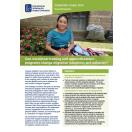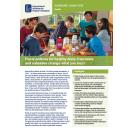Do programmes outside the formal education system improve children’s literacy in developing countries?
For a majority of children globally, the substantial increase in access to primary schooling has not led to a significant improvement in learning. To address this learning gap, numerous are being implemented outside the formal education system to improve children’s literacy.
A recent 3ie-funded systematic review examined the effectiveness of that are aimed at parents, families and communities for improving children’s literacy in low- and middle-income countries. The reviewers assessed the effectiveness of educational television, interventions that show parents how to support their children’s readiness for school, and interventions that use a tutoring approach involving peers or adult community members.
Main findings:
- Educational television, when viewed three to five days a week over four months, had a positive effect on the literacy of children of pre-primary school age.
- Interventions that showed parents how to develop their child’s readiness for school were found not to be effective overall.
- There is no rigorous evidence available on the effectiveness of several kinds of supplementary interventions, such as community libraries, reading clubs, local
, electronic readers and laptops intended for use outside school, religious instruction, and community.




